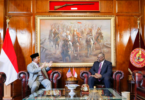WASHINGTON (thehill): Vice President Harris is enduring a difficult first foreign trip as vice president, highlighting the difficulty she faces in her role as the Biden administration’s chief official handling the flow of migrants from Central America.
After Harris bluntly told migrants “Don’t come here” in a press conference Monday, she was blasted by progressives in her party and at the same time was targeted by Republicans for not doing enough to help the ongoing problem at the border. And in an NBC News interview on Tuesday, Harris flubbed a response asking if she had plans to visit the border.
“We are going to the border, we’ve been to the border,” Harris said before NBC’s Lester Holt reminded her that she hasn’t been to the border. “And I haven’t been to Europe.”
Even Democrats conceded the trip hadn’t gone as well as it was intended.
“She is going to be haunted by this trip and this issue for as long as she is in politics,” said one Democratic strategist, in no uncertain terms. “The border is a thorny issue and she can’t win inside her party and she’ll be targeted for these comments for a long time from Republicans.”
“Issues like immigration are not the ones that anyone would sign up for given the obvious political risk,” Democratic strategist Joel Payne added.
At the press conference on Monday, Harris was pointed in her remarks: “As one of our priorities, we will discourage illegal migration. And I believe if you come to our border, you will be turned back.”
“Do not come. Do not come,” she followed up. “The United States will continue to enforce our laws and secure our border.”
After she made the comments, Rep. Alexandria Ocasio-Cortez (D-N.Y.) said it was “disappointing to see.”
“First, seeking asylum at any US border is a 100% legal method of arrival,” Ocasio-Cortez wrote on Twitter. “Second, the US spent decades contributing to regime change and destabilization in Latin America. We can’t help set someone’s house on fire and then blame them for fleeing.”
The message, which Biden administration officials have been repeating for months, was an especially tough pill to swallow for immigration advocates and Hispanic leaders who’ve pushed Harris and the administration to embrace a more welcoming tone.
“The message should have been much more in our American tradition of being a country of immigrants,” said Domingo Garcia, national president of the League of United Latin American Citizens, the country’s oldest Latino civil rights organization.
Garcia added that the Biden administration’s border and Central America policies send a “muddled message” to the people of Central America, as migrant youth are allowed to claim asylum on the U.S.-Mexico border, but adults in the region are told to stay put.
And Garcia complained about the lack of input from Hispanic and immigrant communities in the United States on those policies, although he said the Biden administration’s community outreach compares well to former President Trump.
“They take us into consideration much more so than under Trump, but we’re not on the plane with Vice President Harris. There should have been Hispanic community leaders on the trip,” said Garcia.
Republicans also seized on the comments and the trip overall.
“This unconventional approach is nothing more than a cynical political decision to ensure the blame doesn’t fall on her shoulders by distancing herself from Biden’s border crisis,” House Minority Leader Kevin McCarthy (R-Calif.) wrote in a statement.
The Republican National Committee also attacked Harris for not actually going to the border, saying she “skipped right over it.”
Still, the administration has become somewhat inoculated to Republican attacks on immigration and the border, as the attack lines have remained essentially the same even amid changing circumstances on the ground.
Harris’s allies defended the trip and the “do not come” statement, arguing the plea is appropriate given the current dangers of embarking north through Mexico.
“I understood her saying ‘do not come’ as a compassionate, humanitarian plea because of the dangers of taking the long trek up north, and I have this under the perspective of having spoken with her personally on the matter,” said Rep. Raul Ruiz (D-Calif.), chairman of the Congressional Hispanic Caucus.
“She has a difficult task and she’s very capable of achieving the objective of understanding the root causes of why families are leaving, and put together a comprehensive plan to build hope for people to stay and flourish in their home countries,” added Ruiz.
The White House also backed Harris’s comments, with press secretary Jenn Psaki telling reporters they were made in the context of a flawed U.S. asylum processing system.
“What the vice president was simply conveying was that there’s more to be done, that we don’t have these systems in place yet, it’s still a dangerous journey as we’ve said many times from here and from many forums before. And we need more time to get the work done to ensure that asylum processing is where it should be,” Psaki told reporters Tuesday.
Julian Zelizer, a professor of history and public affairs at Princeton University, said Harris’s comments “won’t be as important as whether she can put forward an overall solution to the immigration challenges facing the nation.”
“Along the way, there are ups and downs, gaffes and accomplishments,” Zelizer said. “But what she will be evaluated on is the bigger picture: Is immigration handled in a better fashion by the time her term as VP is over?”
And for some regional observers, Harris’s trip has been a success in that sense, resetting U.S. relations with Guatemala and Mexico in the wake of Trump’s unilateralism.
“She needs to walk the tightrope satisfying audiences at home but also resetting the partnership with Mexico, which ideally is the key to any strategy moving forward,” said Gerardo Berthin, director of Latin America and Caribbean programs at Freedom House.
Berthin said Harris successfully engaged Guatemala and Mexico — the two countries in the region most open to collaboration with the Biden administration — setting the stage for potential collaborative action down the road.
“There needs to be a certain level of toughness. Maybe the way she posed it wasn’t the correct use of words but it also reflects the complexity of the issue,” said Berthin.
“In a two-day trip the only thing you can do is set the tone, and besides this [comment] overshadowing, I think she set the tone,” he added.
Still, some observers saw that toughness as a deliberate attempt to hedge risks on a tricky political issue.
“Seems pretty clear the White House and the VP’s team want to narrow the expectations about what her diplomacy can accomplish. I think that explains the general careful nature of how she has been talking about the challenges in the system. There is no valor in being in the front of the parade on the issue of immigration,” said Payne.






